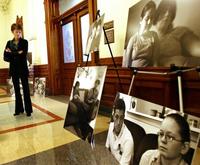Parents tell lawmakers about problems with children's insurance program
March 2, 2007
CHIP, which provides health coverage for working families who cannot afford private insurance, has an enrollment of 325,500, down from more than 500,000 in 2003.
Written by Corrie MacLaggan, Austin American-Statesman

Carol Staton of Georgetown admires photos from the Children's Defense Fund, including one of her and her son, Dylan, that were used in a presentation to a House committee discussing CHIP on Thursday.
Tina Garcia's 10-year-old daughter, Gabriella, who has severe allergies, had been in the Children's Health Insurance Program for seven years when she lost coverage a year after Hurricane Rita.
The Garcias were told they had too much money in their savings account to qualify for CHIP. The money that put them over the limit — about $2,000 — was part of what their insurance company had given them to repair their hurricane-damaged home, Garcia said.
It apparently pushed the family assets over the $5,000 limit put in place by lawmakers during a budget crunch in 2003.
The limit on assets is one of several policies — along with reducing the enrollment period and adding a 90-day waiting period — that led to a drop in enrollment in the program. CHIP, which provides health coverage for working families who cannot afford private insurance, has an enrollment of 325,500, down from more than 500,000 in 2003.
Garcia told the story of her daughter's problems with CHIP to a House panel that is considering 30 CHIP proposals. Lawmakers listened to testimony all day Thursday and were expected to hear colleagues lay out bills until late into the night.
Most of the proposals came from a group of Democratic House members who were joined this week by a key Republican, Rep. John Davis, R-Houston, in their call for repealing the restrictions put in place in 2003. The committee was not expected to vote.
Several CHIP families talked with reporters before they testified. There were tears as parents told stories of living on peanut butter-and-cracker diets so they could afford medical care, of praying that doctors would have free samples of the medications their children needed.
"It shouldn't be so hard to take care of our kids," said Karen Rohrer of San Antonio, who works at a temp agency. "I don't want anything for free."
Rohrer tried for five months to enroll her children, Matt and Tasha, in CHIP when she moved from California about a year ago. Telephone representatives couldn't give her a straight answer about her application and seemed not to care, she said.
"My image of these people are just little teenagers going, 'Yeah, you're fine,' and just moving on like they're selling pizzas," Rohrer said.
A private group running call centers for enrolling Texas families in CHIP and other programs has come under fire for paperwork mix-ups and other errors that led to a delay in services for thousands of families. State Rep. Patrick Rose, D-Dripping Springs, chairman of the House Committee on Human Services, on Thursday formed a subcommittee to investigate problems with the work done by the group of companies led by Accenture.
Garnet Coleman, D-Houston, said that in addition to increasing the number of children covered by CHIP, "There ought to be an acknowledgement that we need to make up for the hassle and the pain this state has put families through."
Corrine Everett of Arlington, who has multiple sclerosis, said her children lost CHIP coverage after she bought a 2003 Ford pickup because she needed a vehicle that could transport her wheelchair. That vehicle apparently pushed the family over the asset limit.
Meanwhile, the Garcia family managed to get reinstated in CHIP in January with the help of the Children's Defense Fund.
But the next time Tina Garcia received a check for home repairs from her insurance company, she didn't want to put it in the bank for fear of losing her daughter's health coverage.
"I had cash in my underwear drawer. I sure did," Garcia said.
![]()
![]()
Related Stories
![]()
Fair Use Notice
This site contains copyrighted material the use of which has not always been specifically authorized by the copyright owner. We are making such material available in our efforts to advance understanding of environmental, political, human rights, economic, democracy, scientific, and social justice issues, etc. We believe this constitutes a "fair use" of any such copyrighted material as provided for in section 107 of the US Copyright Law. In accordance with Title 17 U.S.C. Section 107, the material on this site is distributed without profit to those who have expressed a prior interest in receiving the included information for research and educational purposes. For more information go to: http://www.law.cornell.edu/uscode/17/107.shtml. If you wish to use copyrighted material from this site for purposes of your own that go beyond "fair use", you must obtain permission from the copyright owner.